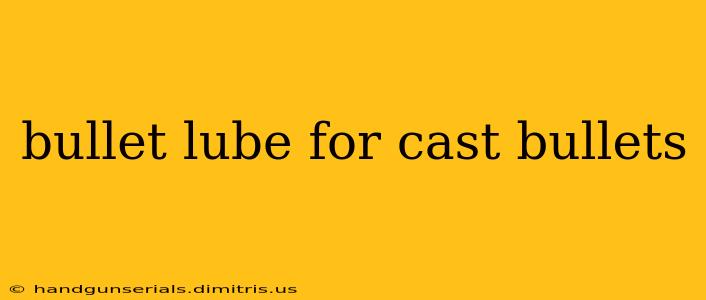Casting your own bullets offers significant advantages to reloaders, from cost savings to the ability to tailor projectiles to specific needs. However, proper lubrication is critical for accuracy, preventing leading in the barrel, and ensuring consistent performance. This guide delves into the world of bullet lube for cast bullets, exploring various types, application methods, and considerations for optimal results.
Understanding the Importance of Bullet Lubrication
Cast bullets, unlike jacketed bullets, require lubrication to protect the barrel from lead fouling. This fouling, or leading, occurs when molten lead from the bullet's surface deposits inside the barrel's rifling grooves. Leading reduces accuracy, increases friction, and can even damage your firearm. Bullet lube acts as a barrier, minimizing metal-to-metal contact and preventing this lead buildup. Furthermore, proper lubrication contributes to:
- Improved Accuracy: A well-lubricated bullet travels smoother down the barrel, resulting in more consistent shot placement.
- Reduced Recoil: Less friction translates to a smoother, less jarring recoil experience.
- Extended Barrel Life: Preventing leading prolongs the life of your firearm's barrel.
- Easier Cleaning: While some lube residue remains, cleaning becomes significantly easier compared to a heavily leaded barrel.
Types of Bullet Lubricants
Several types of bullet lubricants cater to different needs and preferences. Each has its own pros and cons:
1. Alox (Aluminum Oxide):
- Pros: Alox is a very popular choice known for its excellent performance and relatively easy application. It provides good protection against leading and offers consistent accuracy.
- Cons: Can be messy to apply, requiring careful attention to avoid excess lube.
2. Lee Liquid Alox:
- Pros: A liquid version of Alox, making application simpler and cleaner than the traditional paste. Allows for even lubrication.
- Cons: May require more frequent applications depending on usage.
3. Commercial Lubes (e.g., SPG, etc.):
- Pros: Many commercially available lubes offer pre-mixed formulations optimized for specific bullet designs and calibers. Often easy to use.
- Cons: Can be more expensive than homemade solutions.
4. Homemade Lubes:
- Pros: Cost-effective option allowing for customization based on the caster's needs and preferences.
- Cons: Requires precise measuring and mixing, potentially resulting in inconsistent results if not done carefully.
Methods of Applying Bullet Lubricant
The method of application significantly impacts the effectiveness of the lube. Common methods include:
1. Spraying:
- Best for: Liquid lubes like Lee Liquid Alox.
- Advantages: Even and consistent coverage, relatively fast application.
- Disadvantages: Requires proper ventilation and may lead to over-lubrication if not carefully controlled.
2. Dipping:
- Best for: Pastes and some liquid lubes.
- Advantages: Simple and effective, ensuring the bullet is coated evenly.
- Disadvantages: May require multiple dips for complete coverage; excess lube might need to be wiped off.
3. Roll-Lubing (using a lube-sizing die):
- Best for: Pastes and some commercial lubes.
- Advantages: Precise application and sizing of the bullet in one step, ensuring consistent sizing and lube distribution.
- Disadvantages: Requires specific equipment (a lube-sizing die), making it more expensive initially.
Choosing the Right Bullet Lube for Your Needs
The ideal bullet lube depends on several factors, including:
- Caliber: Larger calibers often benefit from thicker lubes.
- Bullet Hardness: Harder bullets might need less lube.
- Shooting Conditions: High-velocity loads might require more robust lubes.
- Personal Preference: Some casters prefer certain lube types based on ease of use and effectiveness.
Conclusion
Selecting and applying the proper bullet lube is crucial for achieving optimal accuracy, extending barrel life, and enjoying a safer and more satisfying reloading experience. Understanding the different types of lubes and application methods will empower you to make informed decisions, leading to consistently accurate and reliable cast bullets. Remember to always prioritize safety and consult relevant reloading manuals for specific recommendations tailored to your chosen caliber and firearm.

